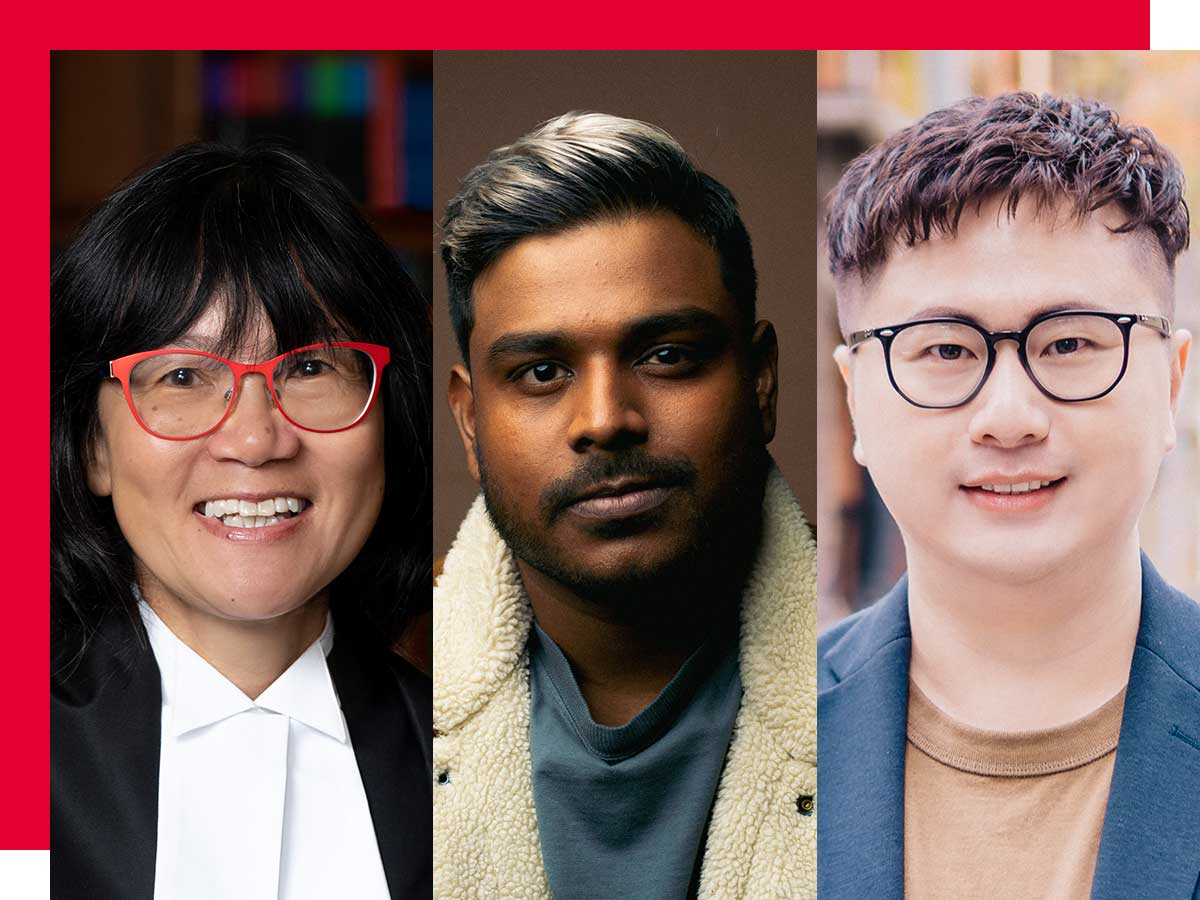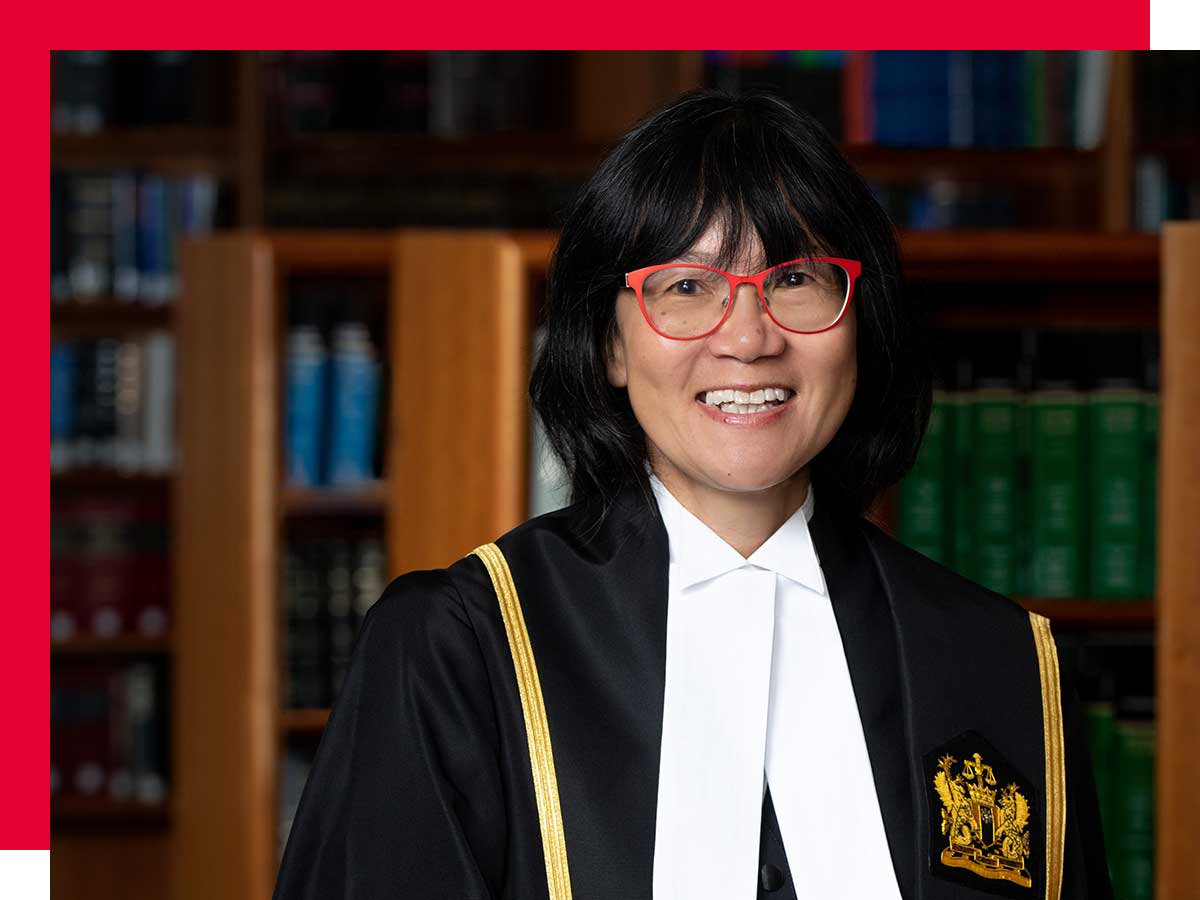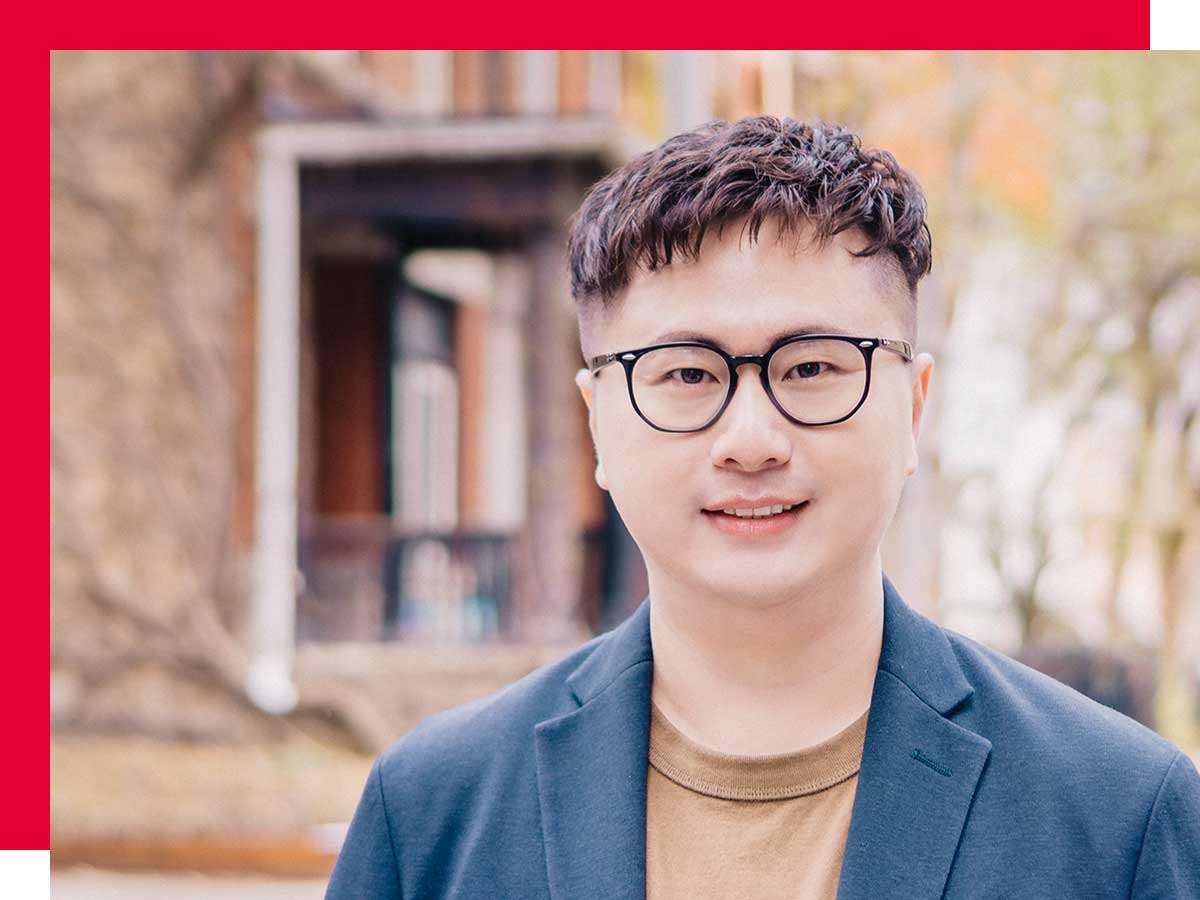Supporting and showcasing Asian Canadian voices

Left to right: Justice Avvy Yao-Yao Go (Photo credit: Andrew Balfour), Ganesh Thava and Jason Wang
May is Asian Heritage Month (external link, opens in new window) — an opportunity for all Canadians to discover the achievements and contributions of Canadians of Asian descent. To recognize this month, we shine a spotlight on an honorary doctorate recipient and two alumni from Toronto Metropolitan University (TMU) who are breaking barriers, sharing cultural stories and speaking out publicly about anti-Asian racism.

Justice Avvy Yao-Yao Go
Honorary Doctorate ’22
Avvy Yao-Yao Go was appointed a Federal Court judge in 2021, making her the first Chinese Canadian to hold the position. Before joining the court, she devoted most of her legal career to breaking down barriers for marginalized groups.
For 30 years, Justice Go was the clinic director of the Chinese and Southeast Asian Legal Clinic in Toronto. She appeared before all levels of court, including the Supreme Court of Canada, helping low-income, racialized clients to fight unjust laws and to challenge systemic racism within the legal system. She also co-founded the Federation of Asian Canadian Lawyers and helped to launch Colour of Poverty – Colour of Change, the racial justice education and advocacy network of Ontario.
Photo credit: Andrew Balfour
What did it mean to you to be the first Chinese Canadian to be appointed a Federal Court judge?
As the first Chinese Canadian to be appointed to the Federal Court, 50 years after its establishment, I am acutely aware of the symbolism of my appointment from a historical point of view, particularly as we will mark the 100th anniversary of the enactment of the Chinese Exclusion Act this coming July 1st. I hope my appointment will help pave the way for more racialized lawyers to join the bench.
What inspired you to get involved with the Chinese and Southeast Asian Legal Clinic?
I was the first in my immediate and extended family to go to law school and become a lawyer. I volunteered at Downtown Legal Services when I went to U of T law and started working with low-income racialized clients facing linguistic and other systemic barriers in accessing legal services. I joined the Chinese and Southeast Asian Legal Clinic as its Clinic Director one year after I was called to the bar to continue my work with racialized communities.
Why is it important to recognize Asian Heritage Month, and why is it personally important to you?
Asian Heritage Month is important to me because it creates an opportunity for all Canadians to have a meaningful dialogue about the place Asian Canadians hold in Canadian society.

Ganesh Thava
Marketing ’17
Ganesh Thava is a Tamil Canadian director, writer and actor. He has appeared in theatre, television and film — including Spin, the first Disney Channel film with a South Asian narrative, and his own film Bark, being released this fall.
Thava uses writing to explore his voice by taking everyday moments, like family feuds or love affairs, and investigating them from underrepresented perspectives. He especially seeks to explore the intersectionalities within these lived experiences through the lenses of ethnicity, status and sexuality. His short film, The Orchid & The Tree, explores the relationship dynamics of a Tamil daughter and her father after her mother passes. It premiered in Canada at the Toronto Reel Asian Film Festival and in New York at the South Asian International Film Festival.
Spin (external link, opens in new window) was the first Disney Channel film with a South Asian narrative. As a South Asian actor, what did it mean to you to be cast in this film?
Being a part of that project put my faith back in the industry. A whole cast of people who looked like me, and a female South Asian director at the helm, were proof the industry was changing. In many ways, this experience gave me the confidence to produce my projects and inspire others to keep the momentum going.
As a writer, you’ve written plays and films focused on South Asian characters and families. Why is it important to you to tell these stories?
I was a quiet and shy kid for most of my childhood. So, to try to break out of my shell, I auditioned for the school production of Romeo and Juliet on a whim. The director didn’t want to hurt my feelings, so he gave me the role of reading the prologue. Although it wasn’t the lead, just my few minutes on stage with all those eyes on me made me realize I had a voice.
From then on, I knew I wanted to continue discovering and sharing my voice through storytelling. I remember doing a children’s show for some 4,000 elementary school kids and being the only South Asian in the cast. During my first show, there was a kid in the audience who looked like a young me. I saw his eyes light up when he saw me, and that cemented for me why I do what I do. Sharing our stories is so important because if we don’t, it’s very easy to lose ourselves.
Why is it important to recognize Asian Heritage Month, and why is it personally important to you?
I think Asian Heritage Month is just as important for those who identify as Asian as much as it is for those who don’t. With all the nuances of being an immigrant or first generation, it is so easy to get misled into believing who you are is not enough. That you need to aspire to be something utterly different from where you come from. Finding the hyphenated identity as Asian-Canadian is essential as we forge the new Canadian identity.
Asian Heritage Month reminds me that I come from a place far from here, with its histories, traditions and traumas that must be recognized. Because through recognizing them, we recognize who we are. As an immigrant, I spent so much of my life trying to forget my past and become a “new me” in Canada. Luckily, through my writing, I’ve connected to my ancestry and found a balanced identity as a Tamil Canadian.

Dr. Jason Wang
MA in Literatures of Modernity ’13
Dr. Jason Wang is Postdoctoral Fellow and Executive Member at the Modern Literature and Culture (MLC) Research Centre (opens in new window) at TMU. His research focuses on the cultural and aesthetic dimensions of power, politics and social values in modernist and contemporary literature and media, and some of his academic work (opens in new window) has examined Chinese culture and representation in literature. He is also the co-editor of Creative Resilience and COVID-19: Figuring the Everyday in a Pandemic.
During the COVID-19 pandemic, when anti-Asian racism was on the rise, Dr. Wang moderated a discussion on Pandemic Xenophobia (opens in new window) at TMU. He also wrote an essay about his assault on the TTC (external link, opens in new window) for Toronto Life magazine.
Why are you interested in exploring Chinese culture and representation in literature?
I count myself lucky to be mentored by some Chinese Canadian scholars and creative writers. When I came to Canada as a Chinese international student, I was excited to discover a prolific body of Chinese Canadian literature that should be taught as an essential part of the multicultural experience in Canada.
To me, these works, such as Wayson Choy’s The Jade Peony and Paper Shadows, and May Q. Wong’s A Cowherd in Paradise, represent a cultural repository of experiences, community values and dynamic identities. Over the years, I have also witnessed new voices of the younger generation of Chinese Canadian writers who have experimented with storytelling as a cultural practice, exploring Chinese culture in relation to the changing global landscape.
The MLC Research Centre (opens in new window) at TMU, where I currently work, supports many Asian newcomer students and scholars in their heritage work. It is a community in which we discuss and research voices and stories that have been historically marginalized and sidelined. At the same time, we also celebrate the creative and cultural expressions of Asian Canadians.
Why did you want to get involved and speak out publicly about anti-Asian racism?
The COVID-19 pandemic has fuelled anti-Asian racism and xenophobia, not just in Canada but worldwide. In other words, the spread of the coronavirus has been accompanied by the social contagion of anti-Asian racism, which has amplified hatred, harassment and violence.
To help build a community during the lockdown and address complex social and cultural consequences induced by the pandemic, Professor Irene Gammel and I launched a Pandemic Webinar series (opens in new window) at the MLC Research Centre in late March 2020. One of the webinars was dedicated to confronting the surge in anti-Asian xenophobia in North America and around the globe.
While I have been unsettled by the rise of anti-Asian racism, being attacked at the St. Clair subway station in Toronto was an altogether new and frightening experience. Even more disturbing was the TTC’s prolonged inaction in investigating the incident. Since the publication of my article about the incident in Toronto Life (external link, opens in new window) , I have heard from many Asian readers who have shared similar experiences of being dismissed by the TTC. Most of them internalized the event, and some even blamed themselves, especially when faced with the transit agency’s inaction.
There is a long history of discrimination against Asian people, from the infamous Chinese Head Tax in Canada to the ongoing aggression and prejudice lobbied against Asian people. Such despicable acts are prompted by accents, eye shapes, names and even food. To me, storytelling is a vital tool to break through these stereotypes and convenient silences. The Toronto Life essay was a platform to dignify and validate not only my own experience, but that of many individuals who had suffered similar experiences. It’s important to voice a call for action for institutional accountability and transparency. We need allies to tackle such a glaring social problem and build hope.
Why is it important to recognize Asian Heritage Month, and why is it personally important to you?
We should recognize that “Asian” is a capacious term, entailing the heterogenous identities of people of Asian descent — geographically, culturally and nationally. In other words, Asian Heritage Month encourages us not to perceive Asians as a monolithic group. With this, I see the designation as an opportunity to recognize the contributions that Asian people have made to the nation building of Canada. It is also an important way to celebrate the diversity of Asian identities, stories and cultures.